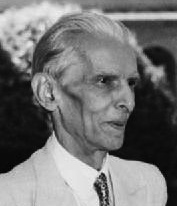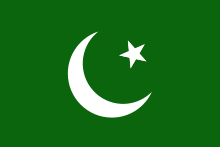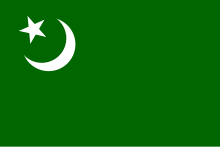Muslim League
The All-Indian Muslim League ( Urdu آل انڈیا مسلم لیگ Āl Inḍīya Muslim Līg , English All-India Muslim League ), short Muslim League (مسلم لیگ Muslim Līg ) was a Muslim political party in India founded in 1906. She played a key role in the preparations for the establishment of an independent Muslim state, which led to the partition of India and the establishment of the state of Pakistan in 1947 .
When Pakistan was founded, the Muslim League there succeeded the All-India Muslim League and became one of the most important political parties in Pakistan: from 1947 to 1958 under the name Muslim League and, after a re-establishment, from 1962 to 1988 as the Pakistan Muslim League .
Since 1962, the Pakistan Muslim League has seen a number of splits and various attempts to reunite the groups. The Pakistan Muslim League (N) was founded in 1988 as an independent and independent party from the Muslim League, which was led by Nawaz Sharif from 1993 to 2018 . Today it is by far the strongest of the successor parties. With 189 out of 342 seats, it was the dominant party in the National Assembly until the 2018 parliamentary elections .
Muslim League in British India

The All-India Muslim League was founded in Dhaka in 1906 . Mohammed Ali Jinnah was elected President of the Muslim League in British-ruled India in 1916 . From this a party developed, which since 1936 increasingly split off from the Indian National Congress and worked towards the establishment of an independent state of Muslims. In this context, Jinnah wrote the so-called Lahore Resolution in 1940 . In 1947, in negotiations with the British on India's independence, he succeeded in dividing the Indian subcontinent into India, which is predominantly inhabited by Hindus, and the Muslim state of Pakistan in the Indus Valley and the Ganges estuary. In the course of the partition, over 4 million Muslims left what is now India, while around 7 million Hindus and Sikhs left the national territory of Pakistan. It is estimated that up to 750,000 people lost their lives as a result of acts of violence and the strains of the flight.
Muslim League in Pakistan
Muslim League (1947-1958)
Jinnah was also the first head of state of Pakistan until his death in 1948. In 1954, the Muslim League, which had ruled Pakistan until then, lost to the opposition Awami League in the regional elections in East Pakistan . Iskander Mirza was installed as the governor of East Pakistan. On March 23, 1956, the first Pakistani constitution came into force, and Mirza became the first President of the Islamic Republic of Pakistan. Between 1958 and 1972 Pakistan was martial law.
Pakistan Muslim League (1962–1988)
1971 after the defeat (West) Pakistan in the Civil War against Bangladesh (formerly East Pakistan) came with Zulfikar Ali Bhutto whose Pakistan People's Party (PPP) to power. In 1977 , after protests by the Pakistan Muslim League and the Pakistan National Alliance (PNA), the Commander-in-Chief of the Armed Forces, General Mohammed Zia ul-Haq, launched a coup .
Spin-offs
Various groups have split off directly or indirectly from the Pakistan Muslim League, including:
- Pakistan Muslim League (F), PML-F for short - Functional Muslim League: founded in 1985
- Pakistan Muslim League (N), short PML-N - N for Nawaz group: founded in 1988
- Pakistan Muslim League (J), PML-J - J for short for the Junejo tribe : founded in 1993, merged with the PML-Q in 2004 through reunification
- Pakistan Muslim League (Q), short PML-Q - Q for Quaid-e-Azam group: founded in 2002
- Pakistan Muslim League (Z), short PML-Z - Z for Zia-ul-Haq group: founded in 2002
- Awami Muslim League: founded in 2008
- All Pakistan Muslim League: founded in 2010 by Pervez Musharraf
After the death of Zia ul-Haq in August 1988 and the victory of the PPP under Benazir Bhutto , the Muslim League-dominated party alliance "Islamic Democratic Alliance" under its leader Nawaz Sharif won the elections in October 1990 . After his dismissal in 1993, Benazir Bhutto was again Prime Minister. In the 1997 parliamentary elections, the Muslim League won an absolute majority. On October 12, 1999, Nawaz Sharif was deposed by the Army Chief of Staff, Pervez Musharraf , in a bloodless coup.
In the parliamentary elections in 2002, a split from the Muslim League, the Pakistan Muslim League Quaid-e-Azam (PML-Q), close to President Pervez Musharraf, became the strongest faction. The Muslim League Nawaz Sharifs (PML-N) was just a splinter party.
In the parliamentary elections in 2008, however, the PML-N became the second largest force behind the PPP in the National Assembly . In March 2009, the PWL-N and numerous lawyers called for several days of protests against government policy. In a "Long March" on the capital Islamabad , demonstrations were to take place for an independent judiciary in Pakistan. On March 15, 2009, serious riots broke out between supporters of Sharif and the police in Lahore. After the Pakistani government gave in to the main opposition demand and announced the reinstatement of several judges, including former Chief Justice Iftikhar Muhammad Chaudhry , Sharif canceled the "Long March".
In the parliamentary elections in Pakistan on May 11, 2013, Nawaz Sharif, as the top candidate of the PML-N, unexpectedly achieved at least 130 of the 371 seats in parliament for many observers. He was particularly successful in his home province of Punjab. On June 5, 2013, he was re-elected Prime Minister.
On July 30, 2013, PML-N candidate Mamnoon Hussain won the presidential election in Pakistan.
Muslim League in India
On March 10, 1948, the Indian Union Muslim League was founded in Madras , which sees itself as the Indian party. 13.4 percent of India's population are Muslim (mostly Sunnis ). The party has the strongest support in Kerala , where it was involved in the government on several occasions. Since the 1980s, several factions such as the All India Majlis-e-Ittehadul Muslims have emerged .
The Indian Union Muslim League has been part of the United Progressive Alliance since it was founded in 2004 and is chaired by Sonia Gandhi . Until 2014, the United Progressive Alliance formed coalition governments with Manmohan Singh as prime minister.
literature
- Sheshrao Chavan: Mohammed Ali Jinnah. The Great Enigma. Authors Press, Delhi 2006, ISBN 81-7273-380-1 . (engl.)
- One Hundred Years of All India Muslim League. University of Chicago Colloquium, November 4, 2006 [1] (Engl.)
Individual evidence
- ^ Escalation before the "Long March" Tagesschau , March 15, 2009.
- ^ NZZ : Political crisis in Pakistan defused from March 16, 2009.
- ↑ Stern : Pakistan's parliament elects Nawaz Sharif on June 5, 2013.
- ^ Mamnoon Hussain elected as the new President in: Handelsblatt.de, June 30, 2013
- ↑ Source: Census of India 2001

